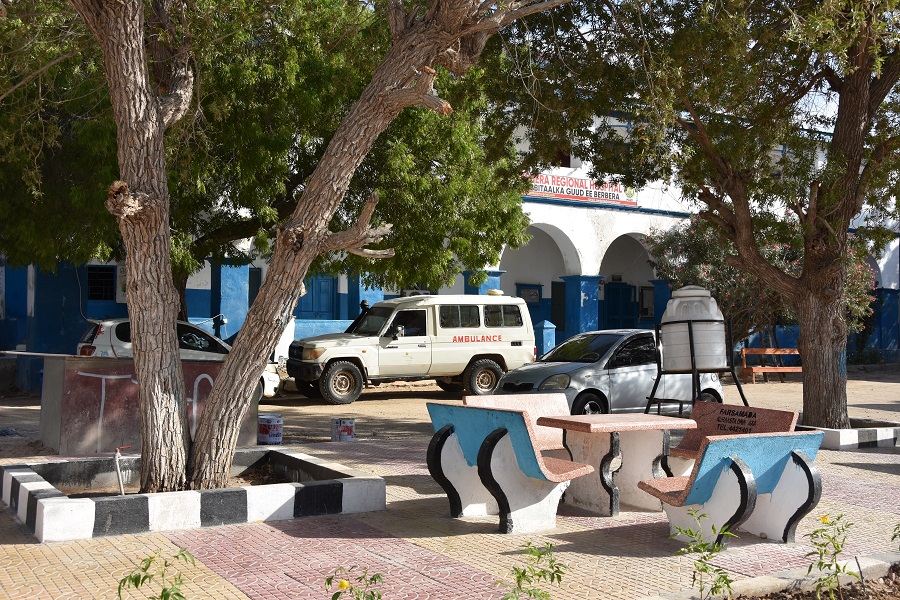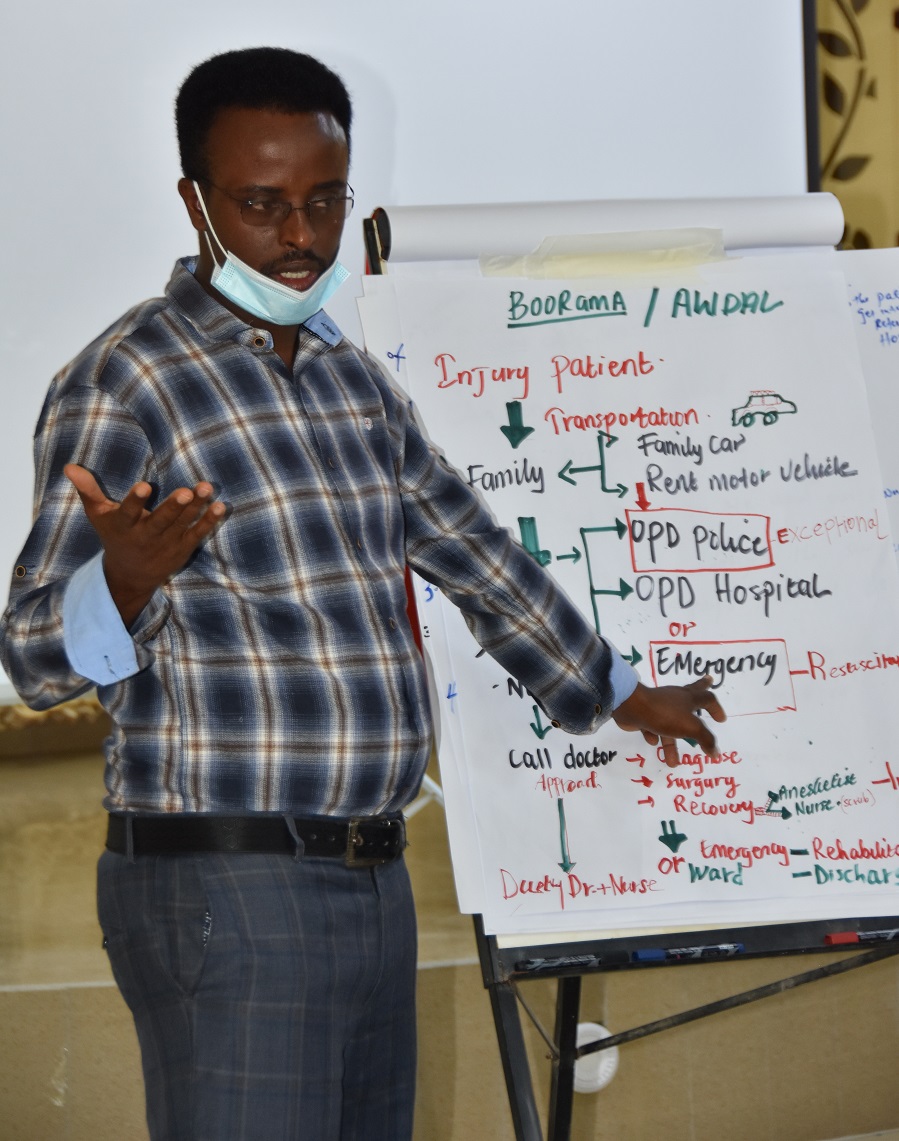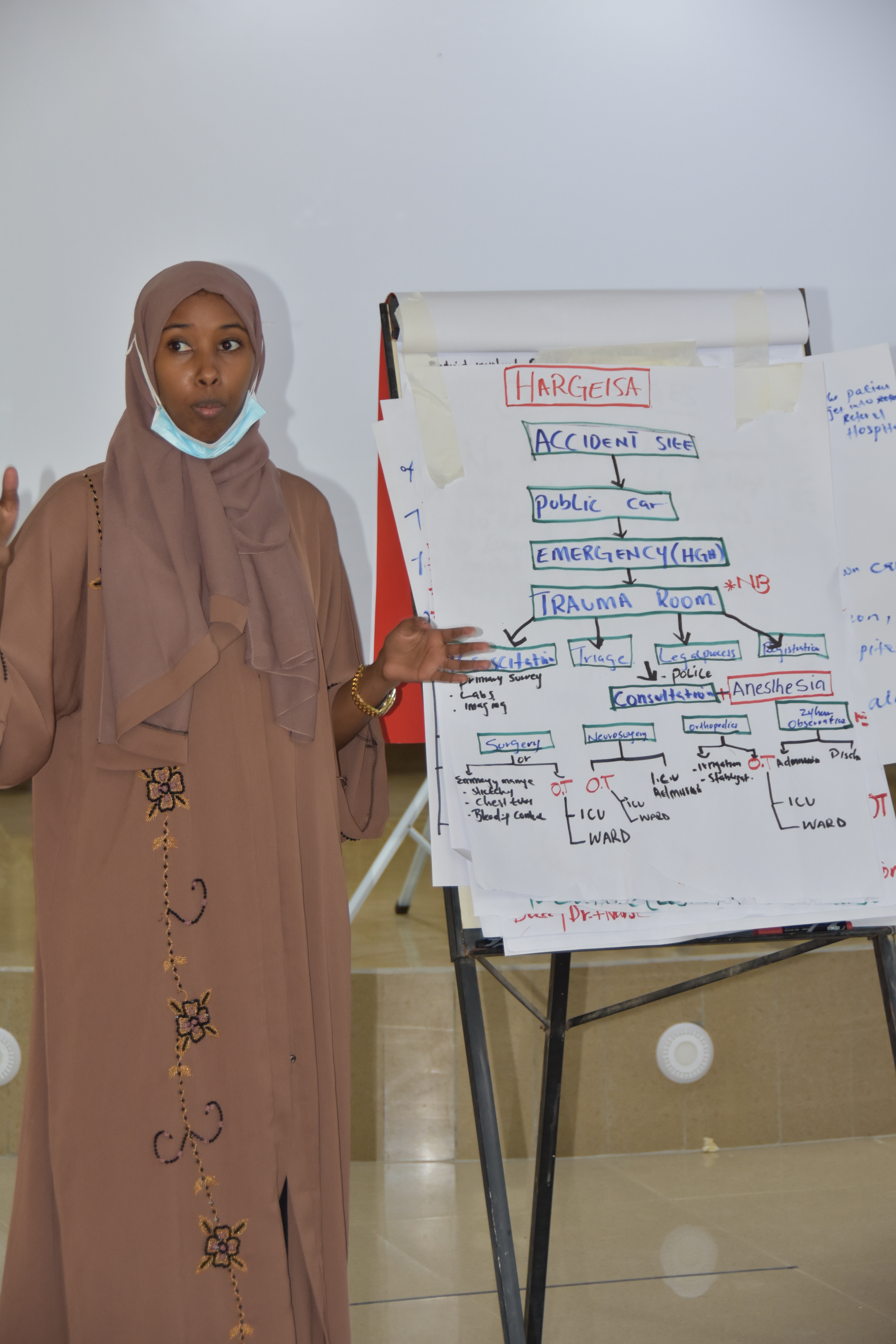 Photo credits: WHO/Andrew Kent
Photo credits: WHO/Andrew Kent
22 November 2021 – Injuries are one of the major public health concerns in Somalia, owing to road traffic accidents and ongoing conflicts. From blast injuries alone, approximately 80 lives are lost every month, and for every death related to an injury, there are 20–50 non-fatal injuries that result in some form of disability, impacting quality of life, productivity and financial security.
There are 2 primary providers for first aid in Mogadishu ─ Aamin Ambulance and the Somali Red Crescent Society ─ but between them they have only 21 functioning ambulances to serve a large population. Approximately, one third of these deaths related to injuries could be avoided if community trauma care, paramedical services and transportation were made available. However, there is currently no effective pre-hospital care system beyond Mogadishu and after emergencies, patients are rushed to hospitals through their own means, often in a private vehicle or carried by relatives.
The lack of an organized pre-hospital transportation system, along with no organized community first aid means that the delay between the point of injury and first contact with the hospital will lead to increased likelihood of death or disability. The situation is further compounded by the lack of a formal organized transport system to move patients from one hospital to another, when they require more complex interventions.
Receiving the right care to avoid injuries and death

Dr Musa Haji, who serves as a first responder to emergencies at the Keysaney Hospital in north Mogadishu, knows the importance of providing early trauma care close to the point of injury.
The driver of the rented car and Ali’s family were not conversant with how to deal with the injuries sustained. If his family had called the local pre-hospital provider, they could have prevented the secondary, serious spinal injury, as Ali would have received professional advice and support.
Investing correctly to reduce high burden and cost of injuries
In low-income countries such as Somalia, families face high burdens and costs of injuries. Yet, this burden can be reduced significantly. Paradoxically, even though Somalia faces recurrent emergencies and natural disasters, it does not have the capacity to offer this crucial support equitably to all of its communities.
“By investing in injury care, we can help communities and countries at large to avoid the exorbitant costs of early death, complications, prolonged recovery, and prevention of disability. The true costs of all these to a family in a fragile, low-income country such as Somalia can be really high,” said Dr Mamunur Malik, WHO Representative to Somalia.
Pre-hospital care key to survival in emergencies

WHO has teamed up with the federal and state ministries of health to build Somalia’s capacity to offer timely and crucial, life-saving prehospital care. This is an integral component of both the emergency care pathway, a journey that begins at the point of injury through to the hospital, and a patient’s referral pathway, which facilitates the transfer of patients with medical conditions from the point of injury or one health care facility to a health facility that can offer the right attention.
“The training and support that WHO and the Government are offering to first responders will serve as scaffolding for emergency health services in Somalia, as we are empowering both health professionals and eventually lay people at the front lines, from the point of an incident or injury to facilities that can care for victims, right back to victims’ reintegration in the society,” added Dr Malik.
As part of this initiative, a team of experts from the WHO Regional Office for the Eastern Mediterranean and WHO country office conducted a workshop on 2 November 2021 to engage with 15 participants from various ambulance services, mostly based in Mogadishu.
“Our findings have revealed that between 60 and 80% of all trauma deaths in humanitarian emergencies across the Eastern Mediterranean Region, occur before reaching the hospital, frequently referred to as dead on arrival (DOA). Community volunteers and frontline providers lack training and supplies for basic life-saving interventions, such as haemorrhage control and airway management. It follows then, that by focusing on immediate and early trauma management as the first phase of this initiative, a significant number of deaths can be demonstrably avoided,” said Dr Sara Halimah, WHO Regional Trauma Specialist.
During their discussions at the workshop, participants also discussed the current situation and low-cost, high-impact solutions to establishing pre-hospital care.
“People don’t make way for us”
Participants also highlighted some of the challenges they face, including no roads and insecurity, which hinders access to people in need.
“At times, when emergencies occur, families of victims don’t call or use us. They prefer to use private vehicles, as they don’t understand what we do, and why we would help them,” said Dr Abdirahman Ali Dahir, Anaesthetist and Consultant from the Aamin Ambulance services. “In many cases, in traffic, people don’t make way for us, as they do in developed countries. The lack of community awareness is a big challenge for us which slows down our response during emergencies.”
In addition to this challenge, most states do not have ambulances. On the limited occasions when ambulances have qualified staff, they do not have adequate life-saving equipment, such as torniquets that can help reduce severe bleeding, and staff cannot access standard accredited courses or training to help them refresh their knowledge, skills, and reaction time during emergencies.
Given the need for frontline emergency responders to continuously develop their skills, workshops like this will help to develop manuals and a roadmap for future training programme. This in turn will have a positive impact on enhancing emergency and trauma care services in the country.








